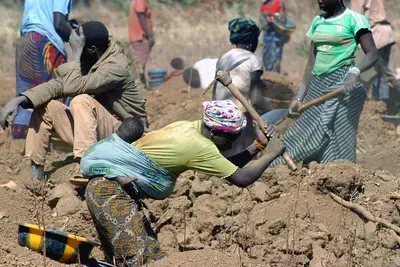
Success Story
Democracy on China’s Doorstep – Why Burma Matters
On the front lines of Burma’s resistance to authoritarianism, young activists are not just fighting a military junta—they are defying Beijing’s shadowy support for the regime. At a hip yet discreet coffee shop on the Thai-Burma border, I recently sat with two pro-democracy activists who looked more like students cramming for exams than activists plotting to restore freedom to a country under siege. They calmly described their work supporting non-violent “civil resistance groups” operating deep inside Myanmar’s contested towns. These young women and men should be building their future in a stable, democratic Burma, not risking their lives to reclaim it.
China’s involvement looms large over this struggle. Why? Because a pluralistic Burma, with a tapestry of ethnicities, religions, and languages, woven into a functioning democracy, would be a powerful refutation of China’s authoritarian narrative. Just as Taiwan’s democracy shatters the myth that Chinese culture and liberal governance cannot coexist, a democratic Burma would inspire others to believe that long-standing conflicts and cultural complexities need not preclude freedom. This vision of Burma directly challenges Beijing’s influence and its broader narrative that authoritarianism is necessary for stability in diverse societies.
In the wake of a devastating earthquake, Beijing quickly pledged aid and dispatched relief teams. But even in tragedy, China’s assistance largely flows through the junta it backs, reinforcing its leverage and strategic access under the guise of generosity. Burma’s value to China cannot be overstated: it offers direct access to the Indian Ocean, bypassing the Malacca Strait chokepoint, and is a key anchor for China’s Belt and Road Initiative. Pipelines, deep-water ports, and planned rail lines link Yunnan Province to the Bay of Bengal, making Burma critical to China’s energy security and regional ambitions. Add in Burma’s rich deposits of jade, timber, and rare earth elements, and it is clear why Beijing views the country as too valuable to lose to democracy. Beyond resources, the junta has turned Burma into a hub for criminal enterprises, including scam centers that fuel human trafficking, cyber fraud, and financial crimes. These illicit networks not only destabilize the region—they directly target Americans, siphoning hundreds of millions of dollars from U.S. households and businesses each year.
Listening to these young activists, both of whom have served time in Burma’s prison system for their resistance work, I kept thinking: They should be building a future, not fighting for basic freedoms. A “civil resistance group” in Myanmar is what you get when student leaders, former civil servants, labor organizers, and farmers’ kids band together to share information, coordinate protests, and document abuses to sap the regime’s grip on power. Think of it as a 21st-century freedom fight, fueled more by encrypted messaging apps and wily tactics than by guns. These activists blend creativity, courage, and moral clarity under the constant threat of imprisonment or worse.
On the ground, the pro-democracy fighters in Burma don’t have advanced weaponry. They rely on improvised means, small arms, and clever tactics, while the junta employs Chinese and Russian hardware—heavy artillery, drones, and airstrikes that target civilians. The playing field is lopsided, yet these activists press on, each step forward exacting a toll in blood and heartbreak.
The battle for democracy in Burma is a fight for the people of Burma to win, but it isn’t just their own. The outcome will resonate throughout the region and impact China’s influence in Asia and globally. Supporting Burma’s pro-democracy movement is not just morally right—it is a win-win-win for the United States and democratic allies: a moral responsibility, a benefit to American geopolitical and geoeconomic interests, and a strategic imperative in countering Beijing’s influence.
First, supporting the cause of Burma’s young activists, like those I met on the Thai-Burma border, is a moral responsibility that also aligns with America’s long tradition of supporting those who risk everything to free themselves from tyranny. Their calm determination and focus under unimaginable pressure remind us that the fight for democracy is not an abstract idea, it is a deeply human struggle for dignity and freedom that is being fought on the ground at this moment.
Second, support for the pro-democracy movement in Burma is a win for American leadership. The BURMA Act, a bipartisan achievement, has already laid a strong foundation. Building on this commitment with additional resources and sustained engagement would amplify America’s leadership, sending a powerful message that the United States is unwavering in its support for freedom, justice, and the rule of law. At a time when global democracy is under pressure, this support underscores America’s credibility as a defender of core values and as a reliable partner to those who seek freedom. The impact of this commitment extends far beyond Burma—those fighting for democracy in Venezuela, Iran, Russia, North Korea, and China are paying attention. And when the pro-democracy movement eventually prevails in Burma—and yes, these young activists stand a real chance—the people of Burma will remember who stood with them in their struggle. In addition, a democratic Burma could also be a vital economic partner for the United States and its allies. With its rich natural resources, strategic geography, and entrepreneurial population, Burma can become a dynamic trading partner and regional hub—if freed from authoritarian misrule.
Finally, investing in Burma’s movement is a strategic imperative against China. A free and democratic Burma represents a direct challenge to Beijing’s authoritarian ambitions and disrupts its efforts to dominate the region. By supporting the National Unity Government, ethnic resistance groups, and civil society actors, the United States weakens the junta’s grip on power and thwarts China’s attempts to exploit Burma’s resources and strategic location. By standing with Burma, the United States not only strengthens democratic resilience in a critical region but also demonstrates to allies and adversaries alike that authoritarianism can and will be challenged, even on China’s doorstep.



